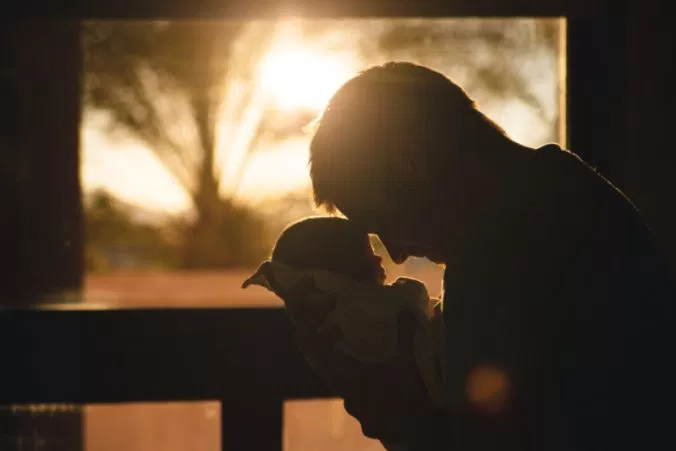If there’s one thing that is almost certain in the wide range of baby personalities and particularities, it is that babies will cry. All it takes is a loud sneeze, or a few minutes too long between feeding, or for my baby, being strapped in a car seat more than ten seconds, and the lip pouts, the chin quivers, and the wailing begins. Consequently, one of the universal parenting necessities is to have an arsenal of comforting techniques to calm our crying babes. We want our babies to be happy and feel cared for and safe.
We also want them to stop crying.
I know how much a crying baby can get to you, and I know that I have had it easy. Mine never had colic or chronic illness. Only car seat intolerance. And sitting in horrendous DC traffic with a screaming baby in the backseat, feeling completely powerless to help her, I think I would have done or said just about anything to get the crying to stop.
Except for one thing.
I will not tell my baby, “You’re okay.”
There is a particular soothing method, often combined with shushing (which is supposed to trick our babies into thinking they are still in the womb), that involves repeatedly saying “You’re okay, shhhhhh, you’re okay.”
I totally understand and agree with the intention. I do want her to know that we are with her, that she is safe. In an objective, you’re-not-going-to-die kind of way, she is okay.
But the thing is, she isn’t okay. Or at least she doesn’t feel okay at this particular moment in time. She is upset. She is sad or scared or hungry or lonely or just off. Telling her “you’re ok” while her experience is that she is not can be innocuous, especially in this phase of life where she is too little to understand language. But it also sets a tone. It sends a message that crying to express a feeling is an inappropriate response. It teaches her that she should not trust her emotion, should not share her emotion, at least not with me. It tells her that being “okay”, which means not crying, is the preferred response to things that are hard in her life.
My clinical-social-worker-turned-mama self knows that I may sound over the top. And the last thing I want to do is to add another judgmental voice to the cacophony of parenting advice, especially the particularly scathing voices about crying. And yes, there are times when babies fall, or repeatedly bump themselves in the head with their favorite toy, or, heaven forbid, are forced to eat prunes, that they look to us to know how to respond, whether to laugh or cry. And in those moments, it’s important to let our babies know that prunes are not poison, that it’s okay.
But I do believe that our children know when we give them space to be their full selves, to experience the full spectrum of emotion. They feel our empathy, even if they don’t understand the words we say. And they also feel when we are dismissive of their emotion or experience.
In a culture that tells us that what it means to be strong is to be stoic, I want to start teaching my daughter now that what it means to be strong is to be present and honest and brave in the midst of hard things. In a culture that tells us that we should never cry in front of others, I want to start teaching my daughter now that tears can be a healthy release and a gift when they are shared with others.
I want to model for my daughter how to sit with the suffering of others with compassion and spaciousness, so that she can do the same.
If someone came up to me during one of my many postpartum sob-fests and told me, “You’re okay, you can stop crying,” I’d probably throw a sodden nursing pad at them and send them out the door. We know as adults that when we feel sad, when we cry, we don’t need someone to fix it or stop it, we just need someone to hold us until the sobs subside.
I want to practice the same with my sweet baby. So when she cries, I pick her up, I bounce her, I rock her, I cuddle her, and I tell her, “I’m sorry you’re sad. I love you. I’m with you. You’re not alone.” I hope these words are words of connection, that when she is old enough to understand what they mean, they make a space for her to feel what she is feeling and to share it.
And when I dream of her future, I like to picture her with her friends, with her partner, with her own baby someday, saying those same words, “I’m sorry you’re sad. I love you. I’m with you. You’re not alone.”
Because I believe that words like that have the power to heal the world.
In a world that has been full of grief and anger and outrage and fear and all the feels lately, perhaps we need even more reminders to feel what we are feeling in order to move forward. Because no, it’s not okay, we’re not okay, our country and our world is not okay. Let’s cry, let’s hold each other when we cry. How healing could our collective tears, shared with one another, be? How much power to unite us could they hold?
May we all honor the wide spectrum of our human emotion and experience in a way that validates each other’s pain, so that we can also share in each other’s joy. May we be more deeply human with each other. Maybe, maybe, that’s a small part of the way forward.
Originally published at medium.com


